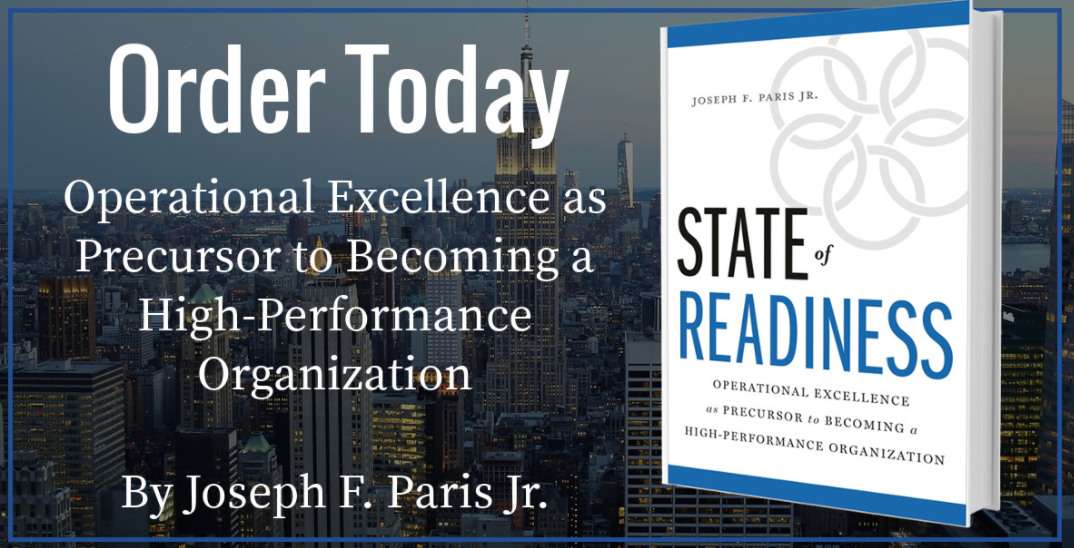 Operational Excellence is a term you’ve probably heard a thousand times. So what is operational excellence—what is the definition of operational excellence— what does it mean? And why is it important? Before we can be it, we have to know what it is. If I were to stub my toe on it, what would it look like?
Operational Excellence is a term you’ve probably heard a thousand times. So what is operational excellence—what is the definition of operational excellence— what does it mean? And why is it important? Before we can be it, we have to know what it is. If I were to stub my toe on it, what would it look like?
Let’s start by differentiating operations from operational. Operations is about processes, whereas operational deals with systems—even entire enterprises. Accordingly, there must be a difference between excellence in operations, or process excellence, and operational excellence. Simply put, excellence in operations is efficiency—doing things right—but operational excellence is effectiveness—doing the right things.
For instance, when the US Navy makes the determination that a carrier group is operational, it means the carrier group, as an entity, is in a state of readiness to fulfill the purpose for which it is intended. And all of the nearly infinite number of individual processes that determine how the operations of the group are conducted are optimized and configured into systems that govern how the carrier group performs. When that state of readiness is achieved, the carrier group acts as a high-performance organization.
We need to fully understand the term before we can pursue it as a strategy. I propose the following definition:
“Operational Excellence is a state of readiness attained as the efforts throughout the enterprise reach a state of alignment for pursuing its strategies; where the corporate culture is committed to the continuous and deliberate improvement of company performance AND the circumstances of those who work there – and is a precursor to becoming a high-performance organization.”
In a state of readiness, the company has attained a situational and capability awareness and, along with it, the ability to react—in a meaningful and expeditious manner—to any opportunities and threats that may present themselves; keeping in mind this awareness will never be perfect and will need to be perpetually refined.
As the efforts throughout the enterprise, from the vendor’s vendor to the customer’s customer—every calorie expended and every bit of treasure invested, from inception through execution and even after action, all activities from all resources and assets in any capacity, must be dedicated to this endeavor.
The business practices transparency and communicates its ambitions and vision of the future in a clear and concise manner such that all of this energy, effort and the assets available reach a state of alignment and a unity of purpose and action throughout the enterprise might exist for pursuing its strategies.
That there demonstrably exists—through its effective leadership, stewardship, mentorship, and followership—an ethos throughout the enterprise where the corporate culture is committed such that everyone is unreservedly devoted to the effort.
With this highest level of alignment and commitment achieved, the enterprise is prepared to proceed to the continuous and deliberate actions it needs to perform. But the enterprise is not just always moving in a constant manner, but moving in an intentional, calculated, and engineered manner with not only a sense of purpose but with purpose itself. Operational excellence cannot be achieved by accident.
The improvement of company performance means simply means to improve profit in a sustainable manner—the bottom line, EBIDTA, shareholder value, and whatever metric you might use to measure performance. There are many ways to facilitate increased profits, but make no mistake, businesses exist to make profits, and their improvement efforts must yield greater profits. And not just engaging in the pursuit of short-term opportunities, but also with an eye to the long term so the viability of the enterprise is ensured for the ages.
The efforts to improve company performance should ensure the company is always innovative and competitively positioned in its value proposition to its present and future customers and to drive both short- and long-term value. These efforts include the following (but by no means should this be considered an exhaustive list):
- Aligning the company’s offerings to the desires of the marketplace and ensuring the messaging and sales efforts are effective
- Making sure the finance and equity structure are optimal for supporting the strategies of the company
- Validating the efficiency and effectiveness of the supply chain
- All other considerations, including those involving operations, such as Lean Six Sigma (LSS), the Theory of Constraints (ToC), Total Quality Management (TQM), Enterprise Resource Planning (ERP), and the entire alphabet soup of management methodologies. Yes, even flow.
In addition to improvements in company performance, the circumstances of those who work there who are instrumental in making the company successful must be equally considered. I don’t necessarily mean pay or compensation, because it’s been my experience that what is important varies with each individual. Most people will not leave a company for a five- or ten-percent increase in pay, but they will leave if they feel disenchanted, disrespected, detached, undervalued, or have no potential for personal or professional growth. They want a sense of pride and ownership. They want their lives to be more joyous, and they want to look at their job as a means to that joy. Company leaders who understand this will reap great rewards, both professionally and personally.
It is a colossal mistake for companies to believe they can improve company performance just by heaping more and more on the backs of their employees. It’s unsustainable and a breaking point will eventually be reached. You need to set the company’s pace for a marathon, not a sprint, and there needs to be enough energy in reserve for a kick when it is needed.
And all of this is a precursor to becoming a high-performance organization, which is the ultimate goal. Your company cannot become a high-performance organization without alignment and commitment; or without effort—and a lot of effort, or without improvements in performance and the lives of the people who work there; or a culture that is not committed to achieving a state of readiness. Your company cannot become a high-performance organization without operational excellence.
Becoming a high-performance organization is the ultimate goal—a business that is best in its class; more successful than its competitors in areas such as strategy development and execution; an efficient and effective organization with clear roles and accountability; delivering superior customer service and maintaining the best vendor relationships; utilizing and maintaining its assets so they reliably produce more; and consistently and sustainably generates more profits.
This is a never-ending race without a finish line.
By Joseph F Paris Jr
Paris is the Founder and Chairman of the XONITEK Group of Companies; an international management consultancy firm specializing in all disciplines related to Operational Excellence, the continuous and deliberate improvement of company performance AND the circumstances of those who work there – to pursue “Operational Excellence by Design” and not by coincidence.
He is also the Founder of the Operational Excellence Society, with hundreds of members and several Chapters located around the world, as well as the Owner of the Operational Excellence Group on Linked-In, with over 40,000 members.
Connect with him on LinkedIn
Author of:
